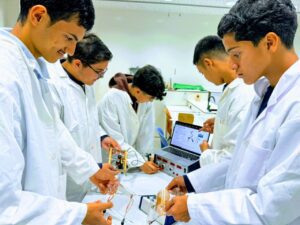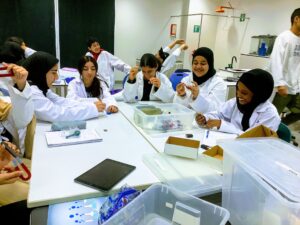 The Middle Years Programme (MYP) sciences framework encourages students to investigate issues through research, observation and experimentation, working independently and collaboratively. The Middle Years Programme (MYP) sciences and the Diploma Programme (DP) sciences are designed to build upon each other and provide a continuum of scientific knowledge and skills for students. The link between MYP sciences and DP sciences can be seen in several key areas such as;
The Middle Years Programme (MYP) sciences framework encourages students to investigate issues through research, observation and experimentation, working independently and collaboratively. The Middle Years Programme (MYP) sciences and the Diploma Programme (DP) sciences are designed to build upon each other and provide a continuum of scientific knowledge and skills for students. The link between MYP sciences and DP sciences can be seen in several key areas such as;
- Conceptual Understanding: Both MYP and DP sciences focus on developing students’ conceptual understanding of scientific concepts and principles.
- Inquiry Skills: MYP sciences emphasize inquiry-based learning, where students actively engage in asking questions, designing investigations, and analyzing data. This fosters critical thinking and problem-solving skills. DP sciences build upon these skills, requiring students to design and conduct their own experiments, analyze data, and draw evidence-based conclusions.
- Scientific Methodology: The MYP introduces students to the scientific method and basic research skills. They learn to formulate research questions, design experiments, and collect data. In the DP, students continue to refine these skills, conducting more complex experiments and investigations. They learn to apply advanced methodologies and techniques, analyze data using statistical methods, and critically evaluate experimental procedures and results.
The significance of Point Number 3, which focuses on Scientific Methodology, is particularly evident in the preparation for Internal Assessments in the group 4 subjects of the diploma program. At ABIS, this is effectively accomplished through the MYP Science assessments in Criteria B (Inquiring and Designing) and C (Processing and Evaluating). These assessments provide MYP students with the essential skills required for successful completion of the internal assessments in the diploma program.
Criteria B: Inquiring and Designing: Students formulate research questions or hypotheses related to a physics concept or phenomenon. They design experiments or simulations to test their hypotheses and collect data. This criterion assesses their ability to plan and design a structured investigation, considering variables, controls, and appropriate measurement techniques.
Criteria C: Processing and Evaluating: Students process and analyze the data obtained from their experiments or simulations. They apply physics principles, mathematical calculations, and graphical representations to analyze and interpret the data. This criterion evaluates their skills in data analysis, error analysis, and critically evaluating the reliability and limitations of their experimental or simulated results.
During this week, the science students in Grade 9 have been actively engaged in completing their summative tasks for Criteria B and C. The culmination of their efforts will be the submission of a comprehensive scientific laboratory report by March 28, 2024. This report is based on a scientific investigation that they conducted as part of their recently concluded unit on electricity and Magnetism.

